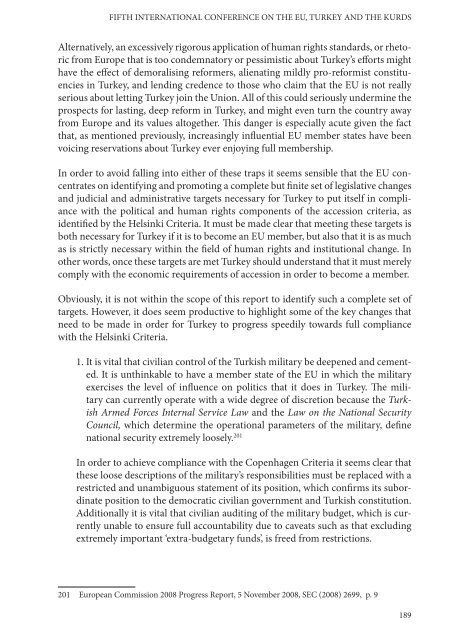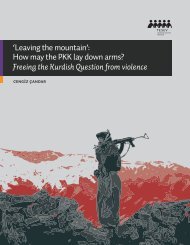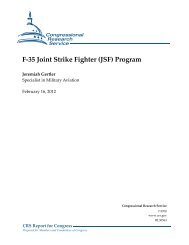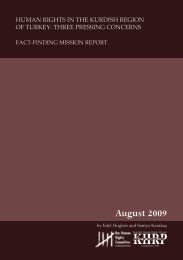FIFTH INTERNATIONAL CONFERENCE ON THE EU TURKEY AND THE KURDS
fifth international conference on the eu, turkey and the kurds
fifth international conference on the eu, turkey and the kurds
Create successful ePaper yourself
Turn your PDF publications into a flip-book with our unique Google optimized e-Paper software.
<strong>FIFTH</strong> <strong>INTERNATI<strong>ON</strong>AL</strong> <strong>C<strong>ON</strong>FERENCE</strong> <strong>ON</strong> <strong>THE</strong> <strong>EU</strong>, <strong>TURKEY</strong> <strong>AND</strong> <strong>THE</strong> <strong>KURDS</strong><br />
Alternatively, an excessively rigorous application of human rights standards, or rhetoric<br />
from Europe that is too condemnatory or pessimistic about Turkey’s efforts might<br />
have the effect of demoralising reformers, alienating mildly pro-reformist constituencies<br />
in Turkey, and lending credence to those who claim that the <strong>EU</strong> is not really<br />
serious about letting Turkey join the Union. All of this could seriously undermine the<br />
prospects for lasting, deep reform in Turkey, and might even turn the country away<br />
from Europe and its values altogether. This danger is especially acute given the fact<br />
that, as mentioned previously, increasingly influential <strong>EU</strong> member states have been<br />
voicing reservations about Turkey ever enjoying full membership.<br />
In order to avoid falling into either of these traps it seems sensible that the <strong>EU</strong> concentrates<br />
on identifying and promoting a complete but finite set of legislative changes<br />
and judicial and administrative targets necessary for Turkey to put itself in compliance<br />
with the political and human rights components of the accession criteria, as<br />
identified by the Helsinki Criteria. It must be made clear that meeting these targets is<br />
both necessary for Turkey if it is to become an <strong>EU</strong> member, but also that it is as much<br />
as is strictly necessary within the field of human rights and institutional change. In<br />
other words, once these targets are met Turkey should understand that it must merely<br />
comply with the economic requirements of accession in order to become a member.<br />
Obviously, it is not within the scope of this report to identify such a complete set of<br />
targets. However, it does seem productive to highlight some of the key changes that<br />
need to be made in order for Turkey to progress speedily towards full compliance<br />
with the Helsinki Criteria.<br />
1. It is vital that civilian control of the Turkish military be deepened and cemented.<br />
It is unthinkable to have a member state of the <strong>EU</strong> in which the military<br />
exercises the level of influence on politics that it does in Turkey. The military<br />
can currently operate with a wide degree of discretion because the Turkish<br />
Armed Forces Internal Service Law and the Law on the National Security<br />
Council, which determine the operational parameters of the military, define<br />
national security extremely loosely. 201<br />
In order to achieve compliance with the Copenhagen Criteria it seems clear that<br />
these loose descriptions of the military’s responsibilities must be replaced with a<br />
restricted and unambiguous statement of its position, which confirms its subordinate<br />
position to the democratic civilian government and Turkish constitution.<br />
Additionally it is vital that civilian auditing of the military budget, which is currently<br />
unable to ensure full accountability due to caveats such as that excluding<br />
extremely important ‘extra-budgetary funds’, is freed from restrictions.<br />
201 European Commission 2008 Progress Report, 5 November 2008, SEC (2008) 2699, p. 9<br />
189





